What happened to Constance Wu is a lesson for all of us
I still remember the moment it happened. It was May 2019 and I was sitting in the backseat of my friend’s car on the way to drop off another friend at his house. “So upset right now that I’m literally crying. Ugh. Fuck.” Twitter was blowing up. “Fucking hell.” These were tweets from actor Constance Wu after her ABC sitcom Fresh Off the Boat was renewed for a sixth season—and she didn’t seem happy about it. When one person told her, “Congrats on your renewal! Great news :)” she wrote back, “No it’s not.” Wu even went as far as to comment on the show’s official Instagram account and wrote “Dislike” on the post announcing the show’s renewal.
The cast of ‘Fresh Off the Boat’
This was followed by intense backlash from fans and online commentators. People called her ungrateful for dismissing an opportunity so many other struggling actors would die for. They said her public dissatisfaction was a slap in the face to the cast and crew who worked on the show. They called her a diva. Jimmy Kimmel joked about her and this incident on his show. Perez Hilton reported she was “the most hated” person on the set of Fresh Off the Boat. Journalist Yashar Ali even wrote in a since-deleted tweet, “Constance Wu’s conduct today comes as no surprise to anyone who has worked with her in recent years. She has a reputation for being rude, petty, mean-spirited, and ungrateful.” Actor Gemma Chan, who co-starred with Wu in Crazy Rich Asians, liked Ali’s tweet. (Chan later clarified she accidentally liked that tweet and said, “Anyone looking for drama or beef, sorry to disappoint.”) I remember going to a gala later that same month hosted by a major Asian American nonprofit, with a predominantly Asian American audience (people call it “Asian prom”), and one famous Asian American comedian on stage made a joke about Wu’s outbursts. Everyone in the room laughed.
It didn’t help that Wu further antagonized people who criticized her Twitter rant. “I said I was upset and crying,” Wu wrote to one critic. “I did not say it was over a tv show. You’re making an assumption.” She ended the day with a final tweet that clarified her tweets from earlier were “on the heels of [a] rough day” and that she was “grateful for the [Fresh Off the Boat] renewal.”
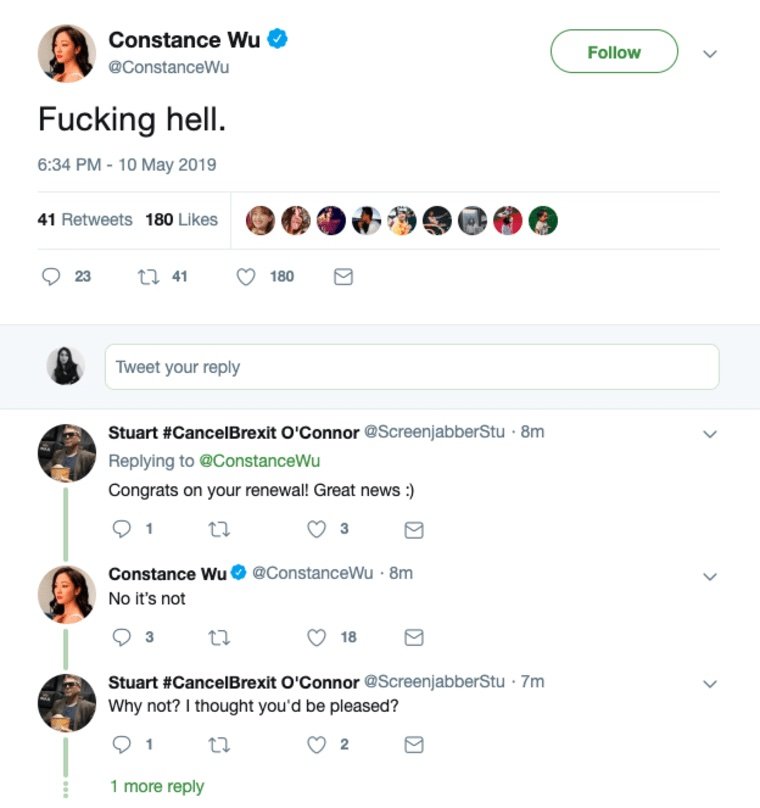
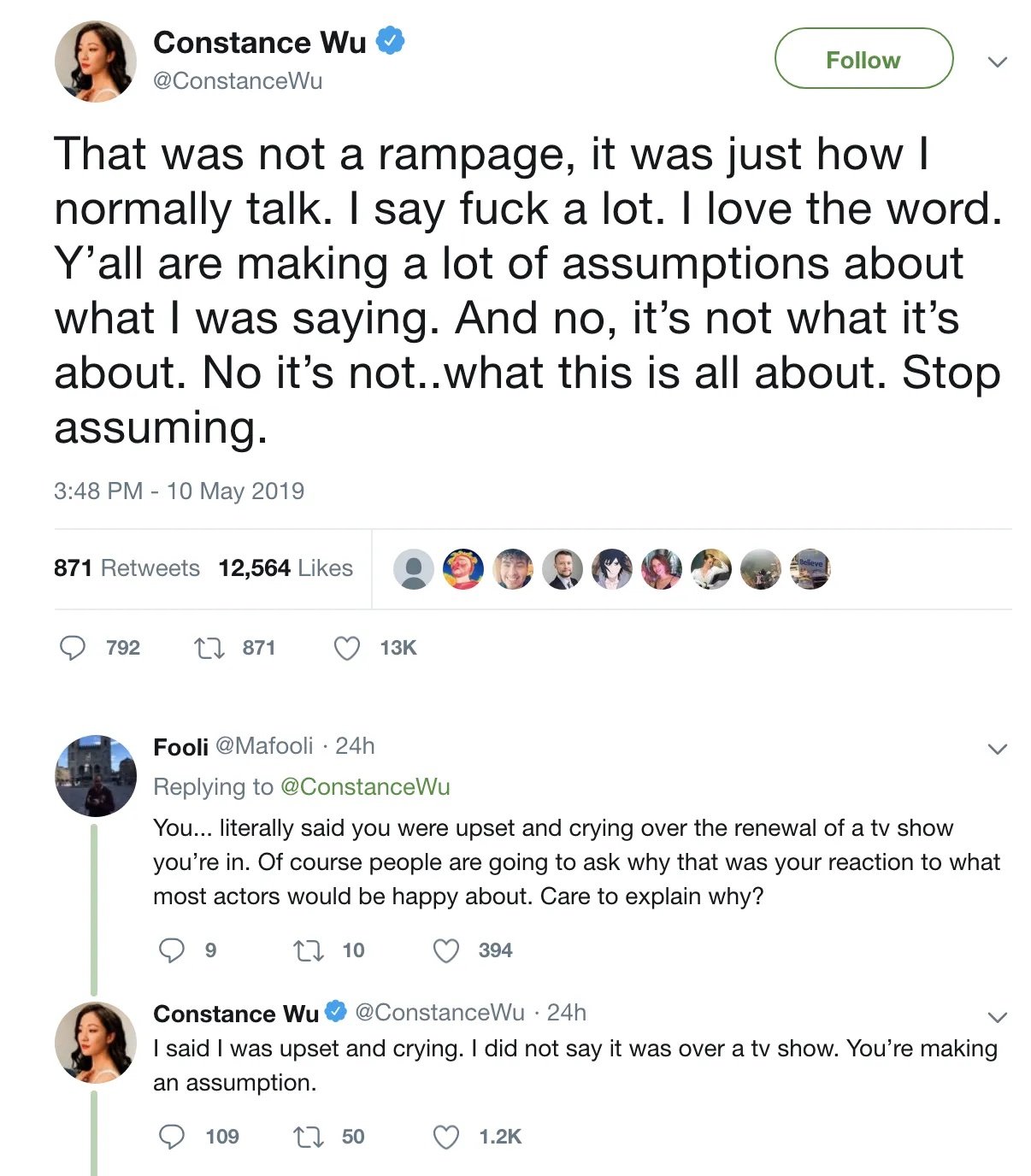
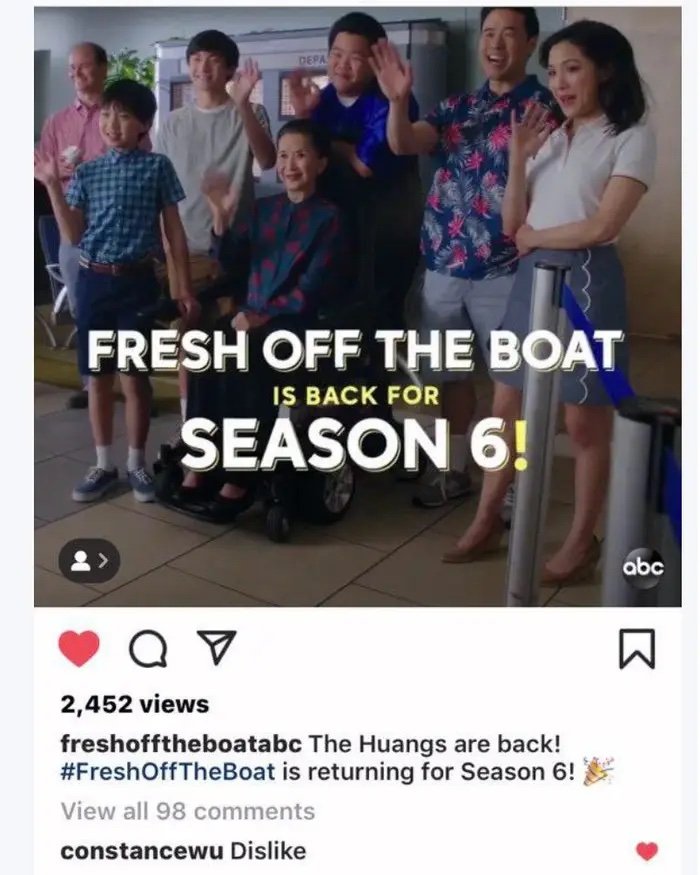
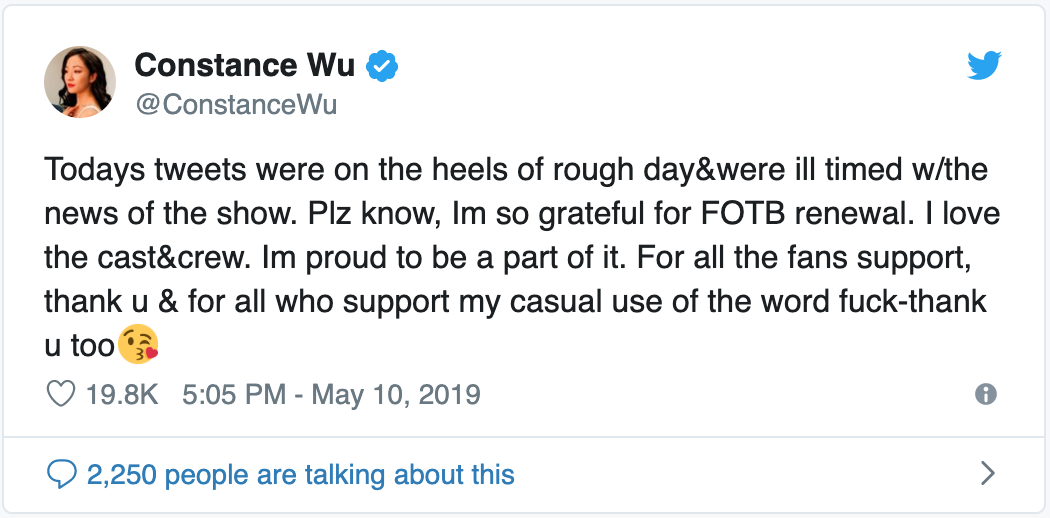
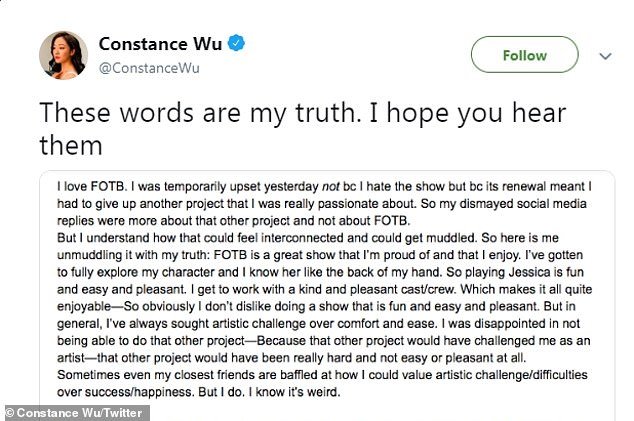
The next day Wu released a statement explaining that her being upset at Fresh Off the Boat’s renewal wasn’t because she hated the show, but because its renewal meant she “had to give up another project that [she] was really passionate about.” She said of Fresh Off the Boat , it’s “a great show that I’m proud of and that I enjoy,” and went on to praise the cast and crew as “kind” and “pleasant.” She expressed regret that her tweets were ill-timed and “insensitive.” “People can hold conflicting feelings in their hearts—that conflict is a part of being human,” she wrote. “I appreciate those who have given me the space and faith to believe what I say about both parts of my heart.” But the words Wu chose to end her statement caused further backlash. “It’s meaningful when you make the choice to believe women,” Wu concluded, seemingly alluding to the #MeToo movement against sexual harassment and assault. That Wu would compare her situation with her show’s renewal to a social movement against rape culture seemed ridiculous, and she then went on a social media hiatus. When she returned from her hiatus this past July, Wu stated she’s spent the last few years going to therapy and writing a book because she nearly took her own life after the backlash from her tweets.
No matter your feelings on Constance Wu, that she was driven to the point of suicide is sad. I believe there are several lessons to be learned from what happened to her, from the way we treat actors and their work, to the role sexism and “representation” plays on actors of color, and how we can productively engage with and critique celebrities.
Actors should be allowed to treat work as work
It’s very common to hear actors refer to their castmates as “family,” especially in highly visible or successful projects. They often add that acting in these projects never feel like work because of how close they are to their on-set family. It’s never easy to tell if such sentiments are genuine or merely for publicity, but more often than not we tend to accept it as true. However, I started to see this idea of “work families” in a different light after HBO Max aired The Fresh Prince Reunion, a special that reunited the cast of the Will Smith-starring sitcom The Fresh Prince of Bel-Air 30 years after the show first aired—including Janet Hubert, the original Aunt Viv.
Will Smith and Janet Hubert reunite in ‘The Fresh Prince Reunion’
Hubert and Smith had been feuding ever since the former was fired and replaced after three seasons on the show. There were rumors that Hubert was fired because she was difficult to work with or because she was pregnant or numerous other reasons. But the reunion special allowed the two to reunite and air it all out for the first time. Hubert said during the third season she was going through personal issues as a pregnant woman with an abusive husband, which led her to becoming more reserved on set, which led her to be perceived as unprofessional. Smith admitted in the reunion that he wasn’t sensitive nor perceptive to Hubert’s problems, that he was young and immature, and that he understood her more now that he’s older and a parent himself. NPR writer Aisha Harris wrote a compelling article recapping the Hubert-Smith reunion and calling for more recognition that we should be allowed to treat our work as work. Harris wrote:
Hubert points out that she was never "unprofessional" on set, only more reserved. It's hard to hear such a revelation and not think of the many ways in which this echoes the corporate mindset of bosses who tout the workplace and colleagues as "family" so as to ignore the fact that, for their employees, this is their livelihood; they deserve to be paid a living wage, to have lives outside of work, to just be human. Smith and his other co-stars talk a lot about how much they enjoyed their experience on Fresh Prince and how it didn't feel like they were doing a job so much as they were part of a tightknit family. That's a heartwarming and admirable kind of environment to exist in, but it's rarely the reality for everyone. And it doesn't leave room for accepting that it's OK to treat your job like it's actually a job, too, especially if your mental health and well-being outside of work are suffering.
This relates to Constance Wu because, like Hubert, Wu was seemingly punished for not meeting unfair expectations that we tend to have with actors. I understand this feeling—I was devastated when Donald Glover decided to leave Community (my favorite show) to pursue other endeavors, and the selfish part of me wanted him to stay in the show because it’s what I thought was best for the show, not what I thought was best for the actor. (His character Troy was one of the two best characters on the show, so it was a big loss.) But we can’t forget that this is still work for actors. When Wu provided her initial apology the day after her Twitter rant, she said of Fresh Off the Boat, “I don’t dislike doing a show that is fun and easy and pleasant. But in general, I’ve always sought artistic challenge over comfort and ease.” She explained she was disappointed at not being able to pursue the other project due to Fresh Off the Boat’s renewal “because that other project would have challenged [her] as an artist.” Writer Roslyn Talusan defended Wu, arguing, “After six years, I’d imagine becoming exhausted of playing the same character, and given the current trajectory of the show, it’s not surprising Wu’s ready to move on.” Talusan explained that Fresh Off the Boat had become “a shell of its former self,” that it’s been “watered down to appeal to wider and whiter audiences.” She pointed to Eddie Huang, the chef and restaurateur whose memoir the show was based on, who quit the show after its first season after not being satisfied with its creative and development process. “Wanting to move on from a shitty job to do better and greater things is obviously a universal experience,” Talusan said. “So I was shocked at how strongly people jumped at the chance to condemn Wu’s actions.”
Constance Wu stars as Jessica Huang in ‘Fresh Off the Boat’
Actors shouldn’t be punished for not living up to unfair expectations from their bosses (like Janet Hubert experienced with Will Smith) or from fans and spectators (Constance Wu with everyone on the internet). If that reason weren’t enough, Wu recently revealed she was sexually harassed by a senior member of Fresh Off the Boat’s production team for a couple seasons, making her wanting to move on from the show all the more reasonable. “I made some very profane, reckless tweets that sort of ignited this whole pile-on of hatred towards me because I’d just had a hit movie [Crazy Rich Asians],” Wu explained to The Atlantic. “So it looked really bad from the outside. ‘Oh she thinks she’s this big movie star,’ when really it was just like, I wanted to have a fresh slate where I didn’t have to start a show with all of these memories of abuse.” None of us could have known this happened to Wu, so perhaps we should give actors the benefit of the doubt when they decide to move on from a beloved project, whether they give us a reason for it or not.
Wu’s “downfall” is part of a sexist cycle
Wu was relatively unknown when Fresh Off the Boat first aired in 2015, but her character Jessica, despite being a supporting character, was a fan favorite, and the show was retooled in its second season to focus on Jessica as the main character. The show was also a big deal because it was the network television sitcom to star Asian Americans in over 20 years since the Margaret Cho-starring vehicle All-American Girl. And in 2018, Wu starred in Crazy Rich Asians, the first Hollywood film to star a majority Asian cast in a modern story since The Joy Luck Club was released in 1993. The film was a critical and box office hit, and Wu had never been more famous. Just a year later, Wu would go on to lead another Hollywood picture, Hustlers, featuring a supporting cast more famous and veteran than she, including Jennifer Lopez and Keke Palmer. (Hustlers was another critical and box office hit.)
Unfortunately, there’s a cost for women who become famous too fast, as outlined by Vox senior correspondent Constance Grady in 2017 to explain the love-hate-redemption cycle of actor Anne Hathaway. (Yes, there was a time when seemingly everyone hated Anne Hathaway aka “Hathahaters.” Not me, though). Grady described four “phases” that famous women often go through: the industry finds a new pretty and talented woman that for some reasons surprises everyone; the woman is suddenly everywhere and people love her; the woman is still everywhere and people hate her; and, finally, their redemption. Constance Wu’s career follows this arc.
Anne Hathaway wins Best Supporting Actress for her performance in ‘Les Misérables’ at the 85th Academy Awards
Grady didn’t just use Hathaway as an example, though. She included other famous women who shot to superstardom, became oversaturated in pop culture, and then fell out of the limelight for a while, only to return for their redemption arc: singer-songwriter Taylor Swift, actor Jennifer Lawrence, even Hillary Clinton. While, yes, these are all white women, this sexist cycle is amplified on Constance Wu, an Asian woman. Not only are Asian women even more underrepresented and underpaid than white women in the entertainment industry, but they’re often treated with less humanity. (Asian women are almost always over-sexualized.) And as a super famous person of color who is “supposed” to represent an entire demographic, there’s enormous pressure to not fuck it up.
When Wu explained why she didn’t make public her sexual harassment experience, she said, “Nobody knew about it because [Fresh Off the Boat] was historic for Asian Americans. And it was the only show on network television in over 20 years to star Asian Americans, and I did not want to sully the reputation of the one show we had representing us.” It’s a heartbreaking admission. People of color have the enormous pressure and expectation to be perfect role models because their communities are so underrepresented. “The harshness behind the overall reaction to Wu’s tweets demonstrates the implicit yet widely-held hostility toward Asian women,” wrote Roslyn Talusan. “It’s unreasonable to expect anyone to sacrifice their ambitions for the sake of their community, and punishing someone for safely vocalizing their frustration is outright dehumanizing.” “When I spoke beautifully about representation, everyone loved it,” Wu said to The New York Times. “But the second they had a chance to find a crack in my facade… It’s funny. It was almost gleeful. It was almost like they couldn’t wait to tear me down. I think the Asian community in Hollywood is still hyper-focused on positive representation, which to me is an illusion. Whole, human representation is more complex. And I think it's interesting to me how, at that time, when I most could have used their help, they were the people who shamed me.”
Constance Wu
Wu’s Twitter rant depicted Asian Americans as full, messy, and human, explained TV critic Inkoo Kang. “I am grateful that she’s willing to claim for Asian America the mantle of the exacting artist,” Kang said. “An archetype that, however undeserved the allowances it gets, is one that’s long been denied to a group of people often characterized as unoriginal robots and mean-for-meanness’ sake Dragon Ladies.” And Wu’s book Making a Scene (releasing this October) is an opportunity to further humanize her. “I try not to make myself out to be a hero,” Wu said of her book. “I try to make myself out to be a pretty normal person who has flaws like everybody else. I’m not really into the actor memoir where it’s like, ‘I overcame the odds, and I’m this person who was humble and just kept working. I was the victim.’ It’s less black and white than simply victim and perpetrator.” Wu added, “I’m relieved to have this book out. I feel like it’s more representative of me than the me that is on a press tour for a movie that’s breaking barriers for Asian representation.”
How can we meaningfully critique celebrities without causing harm?
When Wu went on that Twitter rant, I, like many people, viewed her negatively. I’m not going to deny it, I’m pretty sure I’ve made jokes at Wu’s expense (though I don’t think I’ve ever tweeted about her), and I even saved her “fucking hell” tweet in my memes folder. But then Constance Wu returned from her social media hiatus earlier this year and revealed her suicide attempt, which made me reevaluate the ways in which we engage with celebrities. In hindsight, it should have been obvious that Wu’s Twitter rant may have been a sign of a mental breakdown, of someone who needed help, not attacks. None of us knew Wu attempted to take her own life until that statement. While Wu publicly acknowledging her mental health issues was a helpful contribution to the larger discussion surrounding mental health, we’re also not entitled to know everything that’s going on in her, or any celebrity’s, life.
I’m reminded of people making fun of Black Panther star Chadwick Boseman’s dramatic weight loss, only to regret it upon his sudden death in 2020 and finding out that he’d been secretly battling colon cancer for years. Actor Clarke Peters admitted he had a bad impression of Boseman when they starred together in Spike Lee’s film Da 5 Bloods because Peters noticed Boseman had an entourage on set taking care of him, unaware of Boseman’s cancer. This included Boseman’s girlfriend holding his hand, a “Chinese practitioner” massaging his back, and a makeup artist who rubbed his feet. “I’m thinking maybe the Black Panther thing went to his head,” Peters said. “I regret even having said those thoughts because they were really looking after him.”
Clarke Peters and Chadwick Boseman on the set of ‘Da 5 Bloods’
One of the lessons I always come back to is one taught by one of my favorite teachers from high school. He explained how we often forget to look at strangers with humanity in our daily lives. For instance, when we see someone make a driving mistake, we think they’re a bad driver without considering maybe that person is a good driver normally but they may just be having a bad day. We often make assumptions and final judgements on people without knowing all the facts because it’s easier. We should try to extend a bit more patience and grace into this world.
Like Wu, there are other prominent Asian stars who are both praised and ridiculed by the Asian community, namely Asian American actor Awkwafina (real name Nora Lum) and Asian Canadian actor Simu Liu. Both have have shot to superstardom over the last few years thanks to successful high-profile projects. Awkwafina became the first Asian American woman to win a Golden Globe for Best Actress. Liu became the first Asian lead of the biggest franchise of all time, the Marvel Cinematic Universe. As their statuses rose, so did their criticisms: Awkwafina for appropriating from Black culture and Liu for his boba liberalism. I see people, especially Asians, making fun of the two online all the time. Now that we know Wu’s experiences led her to self-harm, I’m wondering what’s the best way to hold celebrities accountable? How can we meaningfully engage, and critique, them without causing further harm?
Simu Liu and Awkwafina
I think it’s fair to say we can give valid criticisms without calling for death threats or harassing stars online. The easiest thing we can do is not make light of a serious situation. I’ve facilitated workshops educating people about how people of color, particularly Black people, often have their traumas turned into gifs and memes. For instance, Meghan Markle’s interview with Oprah was turned into a meme despite it being the very same interview in which Markle said she was suicidal. There are countless other examples of the dehumanization of Black people used for fodder, including Antoine Dodson and Kimberly “Sweet Brown” Wilkins. I regret making fun of Wu’s situation and making her Twitter rants into a meme, and I’m sure many others regret it too.
Fellow actor Chiké Okonkwo, one of Wu’s close friends, said Wu’s experience made him have more empathy. “My eyes are much more widely open to anyone going through a tough time,” he said. “I think it’s really good for us to take a second to think before we tweet, to consider the human being on the other end before we send.”
Around the time of her Twitter backlash, Wu said she felt like she didn’t “deserve to live anymore” after a fellow Asian actress directly messaged her that Wu had “become a blight on the Asian American community” and that she “was a disgrace to [Asian Americans], and they’d be better of without [her].” Afterwards, Wu found her Asian American colleagues started avoiding her and “iced” her out. Instead of tearing someone down or ignoring them, instead of adding to the negativity, we can offer constructive feedback or try reaching out to them to provide help. “I’ll admit it hurt a lot,” Wu wrote of her experience. “But it also made me realize how important it is to reach out and care for people who are going through a hard time.”
Thankfully, Wu seems to be in a better, happier, and healthier place now. During her social media hiatus she gave birth to her first child, a girl, that she’s raising with her partner. She’s been going to therapy. She has a new family musical film coming out in October called Lyle, Lyle, Crocodile. She’s set to perform in a play, 2:22 — A Ghost Story, this fall. And her book Making a Scene is out next month, which allows her to humanize herself as well as allows others inside her thought process when it comes to uncomfortable subjects. “That’s why I wrote my book and why I’m here today,” Wu wrote in her statement that broke her hiatus. “To reach out and help people talk about the uncomfortable stuff in order to understand it, reckon with it, and open pathways to healing. If we want to be seen, really seen… we need to let all of ourselves be seen, including the parts we’re scared of or ashamed of—parts that, however imperfect, require care and attention. And we need to stop beating each other (and ourselves) up when we do. So while my book is not always the most flattering portrayal, it’s as honest as I know how to be. Because the truth is, I’m not poised or graceful or perfect. I’m emotional. I make mistakes…lots of ‘em!”
Like what you’re reading? Consider supporting me on Ko-fi by donating just $3!
Constance Wu’s book “Making a Scene”







